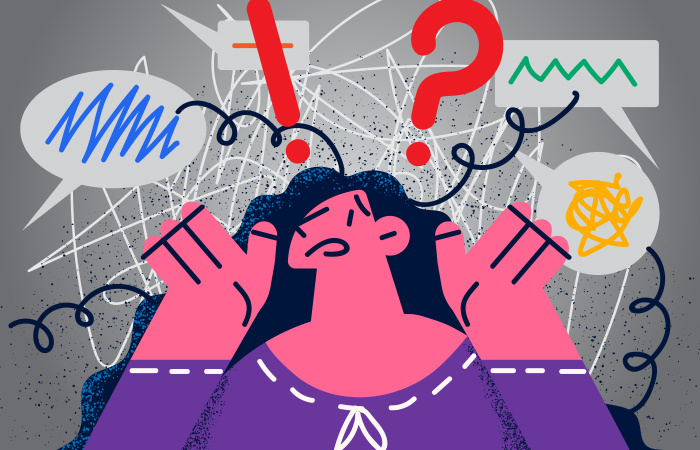Consider these tips when stuck between a rock and a financial hard place.
In a perfect world, everyone would have enough money to pay all their bills on time (every time) with enough left over to build an emergency fund, save for retirement, and take relaxing vacations.
The Paycheck-to-Paycheck Reality
Unfortunately, that scenario is often the exception and not the rule. Millions of Americans living paycheck-to-paycheck are faced with tough decisions every month when their money begins to run out before the next direct deposit hits their checking account.
Whether you are a high-earner or just living above the poverty line, the feeling of being “broke” is common among U.S. residents. A survey published in May 2024 found that some two-thirds (66.2%) of respondents reported feeling that they lived paycheck-to-paycheck.
When you combine that mindset with confusion over how our financial choices can impact other aspects of our lives – ahem, credit scores – it can be hard to know which decisions will hurt the least when it comes to money matters. In other words, it’s not always crystal clear what the least bad decision might be when faced with not being able to pay all of our bills on time.
Which Money Choice is the Least Bad?
Here are some examples of real-life financial decisions people are forced to make when times are tight financially – and some options they may not have considered.
Scenario 1. You have money to cover your basic living expenses, but you only have enough left over to either:
- Pay your mortgage.
- Pay down a high-interest credit card bill.
Scenario 2. You can either pay the:
- Electric bill on time to keep the lights on and avoid a late payment penalty.
- Cover the personal loan payment you took out to pay off some old credit card debt.
You Have Options
While everyone’s situation is different, financial experts say there are some general rules to keep in mind when you are forced to make hard choices and money is scarce.
“When your back is against the wall and you must decide which debt payment to skip, a general rule of thumb is to make the payments with the highest interest rates, and skip the payments with the lowest interest rates,” George Kao, MBA, a certified financial planner with Reach One Teach One Financial.
Another factor to consider, Kao explains, is which debt will have the least impact on your life if a credit line were to be closed.
So, in Scenario 1, when it comes to making your mortgage payment on time or being late with a credit card bill, how much of a hit your credit score will take if you miss the card payment might not be the only thing to consider.
“Losing your primary home or your only car may have a much worse impact on your family than a closed credit card,” Kao states.
If You’re Going to Miss a Payment? Do this.
If you have an unexpected expense that causes you financial stress, and the inability to pay your other bills on time, there are some steps you can take to help the situation. Kao recommends the following:
- Contact each lender to make alternative repayment arrangements.
- Lenders will sometimes change the terms and lower your monthly payments to increase their chances of getting you to repay their debt eventually.
In most situations, he says, a decision like this should not hinge upon the impact on your credit score. “After all, your credit score will take a hit regardless.”
“The best decision is one that has the least impact on your family and one that buys you time to make changes (i.e. getting a higher-paying job or a second job) so that you can get into a situation to pay off your debts.”
George Kao, MBA, Certified Financial Planner, Reach One Teach One Financial
How to Get Back on Track
While some months are worse than others, if you find yourself repeatedly running low on cash, it’s likely time to take steps to right your financial ship. Here’s how to get started:
- Track Your Expenses
Go back and review your last few months’ expenses to figure out where your money is going. Look at your:
- Checking account statements.
- Credit card bills.
- Anything else you use to pay for necessities and extras.
- Make Adjustments
This is usually the hard part. Once you see where your money is being spent (fast food and entertainment could both be culprits here) it’s time to adjust where needed. That means you should probably reign in your spending on anything you can live without until you build up a cash cushion.
- Create a Budget
There’s no one right way to build a budget. The most important thing is to make sure it works for you. Go online and search for household budgets to see which spending plan can help you get your financial life where you want it to be.
- Build an Emergency Fund
While it might seem impossible to save money when you are strapped for cash, it’s absolutely possible. Here are steps to get you started:
- Start small by saving $10 or $20 each week.
- Move the money into a separate savings account.
- Watch it grow over time.
Bottom Line
While millions of Americans are living paycheck-to-paycheck, you don’t have to. You can set yourself and your family apart by implementing some of these tips. If you stay consistent, over time you’ll develop the habits needed to see real improvement. And that’s something you can be proud of.

